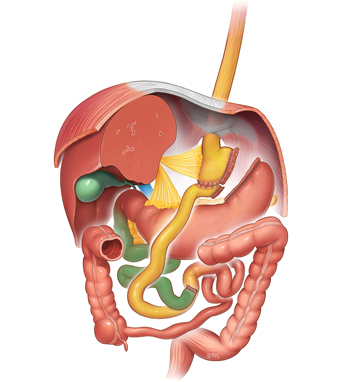Traditional Gastric Bypass (Roux en Y)
A traditional gastric bypass is also known as a Roux-en-Y procedure. It works both by inhibiting or eliminating hunger, inducing early satiety, limiting and altering hormones and receptors in the gut which improves energy utilization and metabolic function.
"Although the gastric bypass is often referred to as a combined volume restrictive and malabsorptive procedure it is neither. Food bypassing the stomach and top of the intestine before mixing with bile and pancreatic digestive juices further down and arriving in the lower intestine earlier causes changes in hormone, receptor and signalling pathways which then bring about metabolic and energy utilization changes in the body."
What is gastric bypass surgery?
Gastric bypass, also called Roux-en-Y, works by dividing the top of your stomach to create a long narrow pouch resembling the upper part of a sleeve gastrectomy in dimensions. The small bowel is divided at a defined distance with staples, then one end is bought up and joined by staples and/or sutures to the small pouch of stomach and the other side rejoined with staples and/or sutures to the intestine at a defined distance further down the intestine.
This allows food to pass directly to the small intestine, bypassing most of the stomach, the whole of the duodenum and first section of small bowel.
The Roux-en-Y Gastric Bypass has been around for over 50 years and has been the commonest weight loss proedure performed worldwide for most of that time period.
However, it is significantly more complex surgery than gastric band or sleeve gastrectomy surgery because it involves both the cutting and joining of different parts of the bowel and stomach together.
Traditional Gastric Bypass
Gastric bypass is an effective weight loss treatment. It is the most effective procedure for controlling acid and bile reflux and has a strong metabolic and hormonal effect on conditions like diabetes.

"Gastric bypass has been shown to be more effective at controlling diabetes than a sleeve gastrectomy and has been around longer so more long term data is available. It is not a bad procedure, but it has its issues like all surgical procedures. The problem is that it is more complex than a sleeve, it carries greater risks to perform and on a yearly basis thereafter. The weight loss from a good, well constructed sleeve is similar to a Traditional Roux en Y gastric bypass."
Because the intestine is replumbed there are areas where the intestine can squeeze through and twist causing internal hernias, bowel obstruction and/or strangulation. This can be potentially life threatening if it is not recognised early and usually managed with surgery to untwist or untangle the bowel. The risk can be reduced but not eliminated by carefully closing the newly created defects and spaces with stitches. Urgent surgical advice should be sought if there is severe abdominal pain after this type of surgery.
Also as food and liquid passes directly into the small bowel and is not controlled by a natural valve then if the food or liquid has a high fat or sugar content then dumping syndrome can occur. These effects can be quite severe leading to low blood pressure and dangerously low glucose levels (hypos). This can be mostly avoided by following the recommendations of our dietitians after the surgery.
Also because most of the stomach and first section of intestine is bypassed Iron, Vitamin B12 and Calcium deficiency is common and requires lifelong supplementation in addition to annual blood tests for monitoring.
The pros and cons of gastric bypass surgery
Electing to have a Gastric Bypass is a life altering decision. The benefits and risks need to be discussed and understood before committing to and having surgery.
The advantages of gastric bypass include:
- Proven to be effective in weight loss and addressing diabetes
- Most effective procedure for both acid and bile reflux
- Discourages eating foods that cause dumping syndrome, such as sugar and fats
Some of the disadvantages to this surgery may be:
- More complex surgery with higher risks to perform
- Vitamin and mineral deficiencies in particular Vit B12, Iron and Calcium
- Potential for anastomotic stricture (narrowing), bleeding or perforated ulcers
- Potential for pouch dilatation and/or anastomotic dilatation
- Up to 1% per year risk of significant complications including internal hernias causing bowel obstruction which can require emergency surgery and may be life threatening
- Further revision surgery is difficult with limited options
We at Upper GI West do not routinely perform a Roux en Y bypass as a primary procedure because:
- The increased difficulty and hence acute performance related complication rate (at least three times greater than a sleeve gastrectomy)
- The increased severe complication rates year upon year (about one in a 100 per year will get a severe complication) which may be life threatening, these include;
- Bowel obstruction from internal hernias
- Bleeding from anastomotic ulcers
- Perforated anastomotic ulcers
- Hypoglycaemic attacks (may lead to increased accidents or death)
- Vitamin and mineral deficiencies
- Limited ability to be able to convert a Roux en Y to another adequate and functional bariatric procedure should there be significant problems or inadequate weight loss or metabolic control occur with the bypass.
Your Specialist Bariatric Surgeon may occasionally recommend gastric bypass surgery as a revisional procedure. Some indications for conversion to Roux en Y bypass may be:
- Uncontrolled acid reflux symptoms despite medication following previous operations eg gastric band or sleeve
- Uncontrolled bile reflux following previous operations eg gastric band or sleeve
- The presence of Barrett’s Oesophagus (hence an endoscopy is crucial before surgery)
"At the end of the day there has to be good reasons why there has been a significant decline in the number of Roux en Y bypasses performed in the USA and the rest of the World in favour of less complex procedures including gastric sleeve.
However Roux-en-Y gastric bypass still has a useful role in revision surgery (and in a primary setting in selected circumstances) especially when patients have severe acid or bile reflux that can't be adequately controlled with medications or simpler procedures."
Why choose Upper GI West to complete your gastric bypass surgery?
The standard way of reconstructing stomachs removed for ulcer disease or cancers is a Roux en Y bypass. Our surgeons specifically trained in the management and surgery of the oesophago gastric system.
We were taught and are recognised as having an expert knowledge base to avert, minimise and manage any complications from oesophago gastric surgery.
We all had supervised and structured training in the performance of oesophago gastric surgery including advanced stapling and suturing techniques in open and laparoscopic cases.
In addition we have the full range of advanced endoscopic skills to diagnose and treat all conditions of the Upper GI tract.
We will draw on our training and experience in offering you a tailored and specific plan for your weight loss journey.
If a Roux en Y bypass is the operation chosen you can be assured it will be performed with the skill, time and care it needs. If you have a complication we have a team with the expertise and skills to facilitate your treatment and optimise your recovery.
We will look after you as a person; becoming familiar with your medical history, preparing you for surgery, managing your recovery after surgery and supporting you through your weight loss phase and beyond.
Our friendly team can help you understand the different procedures and address any concerns you may have.


